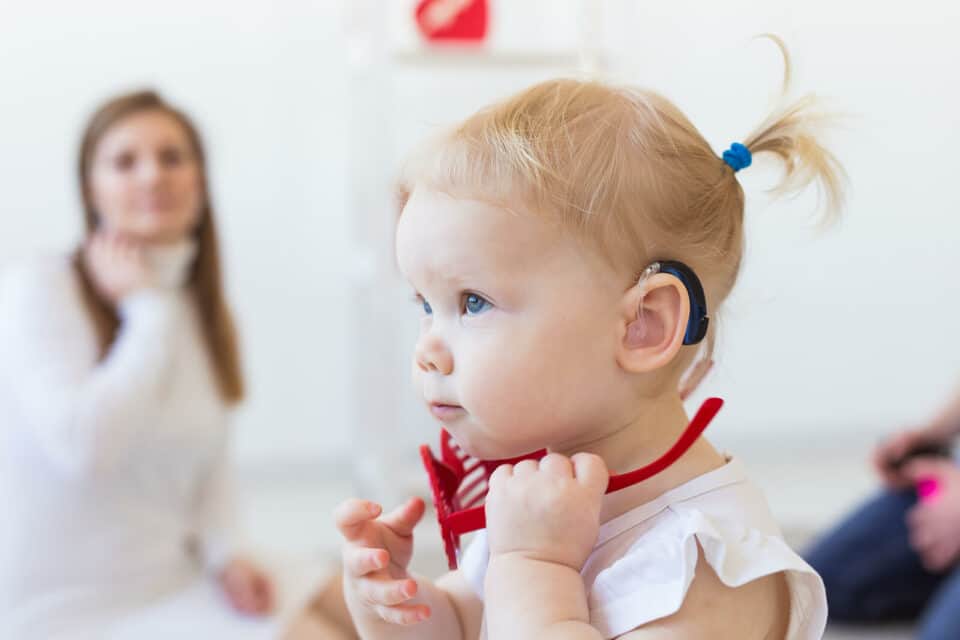
Understanding Hearing Loss in Children
In the delightful journey of childhood, where laughter and discovery abound, there can be a hidden challenge – hearing loss. The ability to hear is crucial for a child’s growth and development, influencing their communication, learning, and social interactions. Let’s take a closer look at the reasons behind hearing loss in children, signs to look out for, and the importance of addressing hearing loss right away.
Hearing Loss in Children
Children experience the world through a vibrant mix of sounds – the giggles of friends, the rustle of leaves, and the soothing sound of bedtime stories. However, various factors can contribute to hearing loss in children, impacting their ability to engage fully with their surroundings.
- Congenital Factors: Some children are born with hearing loss, which can be due to genetic factors or complications during pregnancy and childbirth. These cases are known as congenital hearing loss.
- Ear Infections: Recurrent ear infections, which can be common in childhood, can affect the middle ear and lead to temporary hearing loss. If left untreated, chronic ear infections can contribute to long-term hearing issues.
- Noise Exposure: Exposure to loud noises, such as loud music, fireworks, or noisy household appliances, can cause noise-induced hearing loss in children. It’s essential to limit exposure to high-intensity sounds to protect their delicate ears.
- Illnesses and Infections: Certain illnesses, like meningitis or mumps, can impact a child’s hearing. Infections that affect the ears or the auditory nerve can contribute to temporary or permanent hearing loss.
Recognizing Signs of Hearing Loss in Children
Recognizing the signs of hearing loss in children is important for early intervention and support. Here are some common indicators that parents and caregivers should be aware of:
- Speech and Language Development: Delays in speech and language development can be a red flag for hearing loss. If a child struggles to articulate words, has difficulty pronouncing certain sounds, or has a limited vocabulary for their age, it’s essential to consider hearing health.
- Social Interaction: Children with hearing loss may exhibit challenges in social interactions. They might seem withdrawn, have difficulty following conversations, or display frustration when trying to communicate with others.
- Volume Increase: If a child frequently increases the volume on electronic devices, the television, or music, it could indicate a struggle to hear at normal levels.
- Inattentiveness: Hearing loss may lead to inattentiveness or apparent disinterest, as children may find it challenging to engage in activities that rely heavily on auditory cues.
Impact of Hearing Loss on Children
The impact of hearing loss on children extends beyond the physical aspect of hearing. It influences various aspects of their development and well-being.
- Educational Challenges: Hearing loss can affect a child’s academic performance. Understanding lessons, participating in classroom discussions, and following instructions may become challenging, potentially leading to academic delays.
- Speech and Language Development: Hearing loss can impede the development of speech and language skills. This delay may affect a child’s ability to communicate effectively, express themselves, and engage in meaningful conversations.
- Social Isolation: Children with hearing loss may experience social isolation, as they may find it challenging to connect with peers. This isolation can impact their self-esteem and hinder the development of social skills.
- Emotional Well-being: The emotional impact of hearing loss should not be underestimated. Frustration, feelings of inadequacy, and the challenges of navigating a world that may seem less accessible can affect their overall emotional well-being.
Addressing Hearing Loss in Children
Early intervention is key when addressing hearing loss in children. Here are actionable steps for parents and caregivers:
- Regular Hearing Screenings: Incorporate regular hearing screenings into routine pediatric check-ups. Early detection allows for timely intervention and support.
- Observation and Communication: Pay close attention to your child’s behavior and communication skills. If you notice any signs of hearing loss or have concerns, talk with your child’s pediatrician.
- Limit Noise Exposure: Be mindful of your child’s exposure to loud noises. Use hearing protection, like earmuffs, in situations where loud sounds are unavoidable, such as at concerts or during fireworks displays.
- Assistive Listening Devices: Explore assistive listening devices, such as hearing aids. Modern hearing aids designed for children are discreet, user-friendly, and equipped with features to enhance their listening experience.
Pediatric Hearing Health
Hearing loss in children deserves attention, understanding, and support. If you think your child may have hearing loss, visit us today for a hearing test!
